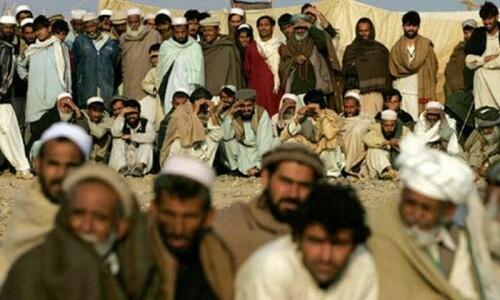This isn’t a fairy tale. This isn’t even a rags-to-riches story. That’s not the main point at least. This is a story about how the system fails you. It’s a familiar story for a lot of Pakistanis, especially athletes who’re not a part of the more ‘glamourous’ sports in the country like cricket. If anything, it should serve as a wake-up call to the government that we need greater transparency in the system and we need to give our athletes that give their blood, sweat and tears towards bringing glory to the country, their fair due.
The film begins with where it all begins, Shah as a kid is, in his own words, a ‘pootpathia’ (someone who roams the streets) and how boxing gets him off the streets. The pace feels somewhat slow at first but after the first 10 or 15 minutes you get used to it. The film follows a classic but simple formula of starting with an interview and telling the story of Shah through flashbacks, but it still manages to work.
Kiran Chaudhry’s character, the journalist Noor, is perhaps the only visible female character in the film and disappears quite inexplicably somewhere in the first half. Her absence isn’t really noticed because her character wasn’t, well, necessary. She might be the journalist in search of Shah, but there’s another one interviewing him in the film.
The best part about Shah? It doesn’t sugar coat anything. Not even in the name of ‘patriotism.’ The system is corrupt and the only person who can rescue you is yourself
Remember how when you’re young you’re often told to do good, be good and in return, good things will happen to you? In Adnan Sarwar’s Shah, the protagonist is the epitome of a good boy. He does as he’s told, he never strays off the straight path even when he get’s cheated out of what’s rightfully his, he’s honest and keeps his friends even when they end up joining gangs. He doesn’t question and he gives his very best to everything.
 |
In return, he wins five consecutive gold medals in the South Asian Games and is considered the best boxer from Asia from 1980-1988. He does this and more all the while remaining completely barefooted — he doesn’t have enough money to buy proper sneakers and the government minister responsible for sending him and paying his salary (a measly Rs200 a month which Shah never gets) refuses to buy them for him.
You’d think the film would end with Shah winning the bronze medal in the 1988 Seoul Olympics and coming home to joyous celebrations in his own neighbourhood. But it turns out, that’s only the beginning. What happens later is what shapes the character of the film and presents us with a memorable but oft-repeated line: “Izzat say paith nahin bharta!” (You can’t feed yourself with glory). In Shah, we see that line being played out.
The best part about Shah? It doesn’t sugar coat anything. Not even in the name of ‘patriotism.’ The system is corrupt and the only person who can rescue you is yourself. The message rings loud and clear and like I said, not something most Pakistanis don’t relate to or feel already.
What’s refreshing about Adnan Sarwar as a method actor is that he as celebrity is not present in the film, the character he plays is. With a lot of ‘established’ actors, they don’t stop being the stars in the film and rarely loose themselves in their characters. Soon you forget that it’s Adnan playing a role, because in the film, he is Shah — he’s adopted the original boxer’s soft-spoken, shy attitude, accent and through make-up transformed himself to a point where he and the original Shah would look more like brothers. He’s not afraid of looking unappealing if that’s what his character demands.
The issues I personally have with the film are small: it looks like it was shot in Lahore and not in Karachi. Most of it at least, minus the scenes where they’ve had to use the beach, which aren’t many. Those streets, the red brick architecture, most of the extras, they’re all quite well done and look appropriately ‘poor’ but they’re not Lyari or its people. This was perhaps the one thing that prevented me personally from losing myself in the film, as engaging as its script is.
Any sport is like a dance. You want to see the players engage each other, you want to see the action up close, but you also want to see the overall perspective. Most of the fight sequences are mostly shot from the perspective of those inside the ring and don’t have the perspective of those outside of it. But like I said, the issues are small and bear no impact on the story.
And finally, a lot has been said about corporate sponsorships of films. Until we have production companies willing to finance their own productions without the help of overt corporate sponsorships, a bit of branding and product placement here and there is something we’d have to live with. The key is to do it tastefully.
You don’t need to have your brand or product showing every 10 minutes to create an impact. You don’t have to have the protagonist propose to his heroine with an ice cream cone (as was the case with a film that was released recently) because that’s just going a bit too far and makes the film appear more like a commercial rather than what it’s supposed to be: a feature film.
Sometimes less is more and in Shah, thankfully, although the brands are there, but they are in the background. And although they are present, Shah doesn’t need them to win a boxing match. Neither do they buy him the shoes that he so desperately needs.
Published in Dawn, Sunday Magazine, August 23rd, 2015
On a mobile phone? Get the Dawn Mobile App: Apple Store | Google Play
















































